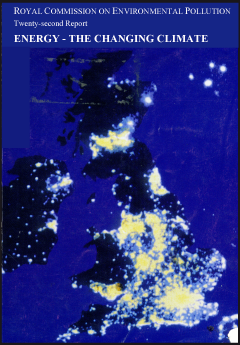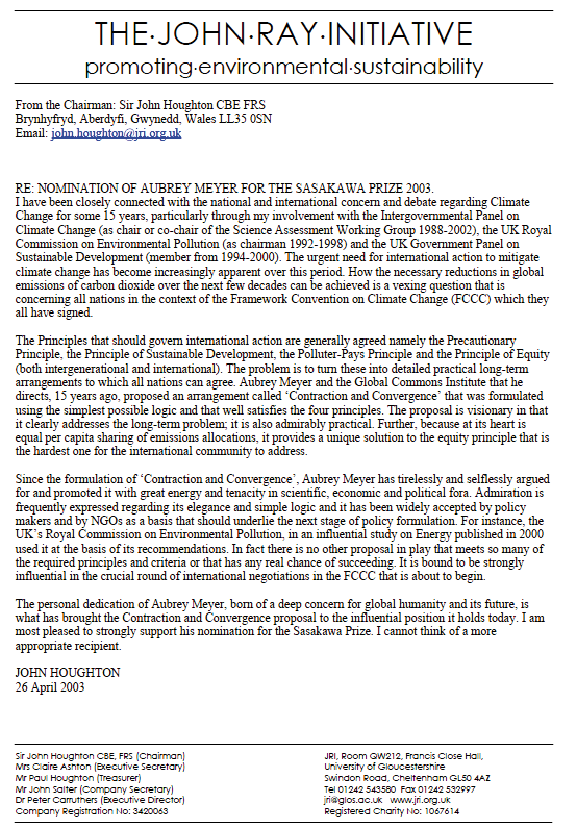Sir Tom Blundell
 Click logo to return to 'links-page
Click logo to return to 'links-page
Back to UNFCCC Submission Back to Signatory List
Aubrey,
I am happy to support.
Tom
Professor Sir Tom Blundell FRS, FMedSci,
Department of Biochemistry, University of Cambridge,
Tennis Court Road, Cambridge CB2 1GA
Royal Commission on Environmental Pollution [RCEP] recommendation in 2000: -"The UK should continue to play a forceful leading role in international negotiations to combat climate change, both in its own right and through the European Union. The government should press for further reductions in the greenhouse gas emissions of developed nations after 2012, and controls on the emissions of developing nations. The UK government should press for a future global climate agreement based on the contraction and convergence approach, combined with international trading in emission permits. Together, these offer the best long-term prospect of securing equity, economy and international consensus."
"The UK-based Global Commons Institute has taken the lead in promoting contraction and convergence and has developed a computer model which specifies emission allocations under a range of scenarios. The concept has been supported by several national governments and legislators. Some developed nations are very wary of it because it implies drastic reductions in their emissions, but at least one minister in a European government has supported it. Commentators on climate diplomacy have identified contraction and convergence as a leading contender among the various proposals for allocating emission quotas to nations in the long term."
implications for UK carbon dioxide emissions
concentration
in 2050 % of 1997 level
in 2100 % of 1997 level"In table 4.1 RCEP has applied the contraction and convergence approach to carbon dioxide emissions, and we have calculated what the UK’s emissions quotas would be in 2050 and 2100 for four alternative upper limits on atmospheric concentration. We have assumed for this purpose that 2050 would be both the date by which nations would converge on a uniform per capita emissions figure and the cut-off date for national populations. If 550 ppmv is selected as the upper limit, UK carbon dioxide emissions would have to be reduced by almost 60% from their current level by mid-century, and by almost 80% by 2100. Even stabilisation at a very high level of 1,000 ppmv would require the UK to cut emissions by some 40% by 2050."
GCI NOTE: - It followed therefore that if 450 ppmv was selected as the upper limit, the UK carbon dioxide emissions would have to be reduced by almost 80% from their current level by mid-century, and by almost 90% by 2100. Tom wrote a nice letter to GCI after the RCEP report was published.
As of 2008, the 80% cut by 2050 for the UK became the figure stated in the UK Climate Act.
"Energy - The Changing Climate" [2000]
The Royal Commission on Environmental Pollution
Chairman Sir Tom Blundell
I support the nomination of Aubrey Meyer. Over the past fifteen years he has developed the idea of Contraction and Convergence as an international solution to the challenge of global warming and climate change. He has done this through the Global Commons Institute with very little funding and infrastructure. These ideas influenced the Royal Commission on Environmental Pollution in the development of its report “Energy: the Changing Climate” and Contraction and Convergence was the basis of the recommended 60% reduction in carbon emissions. This recommendation has been taken up by the government in its recent Energy White Paper and is now the generally accepted basis for policy by a range of government, industry and NGOS. He is a visionary and the award of the Sasakawa Prize would give much support to this very important work, and be a splendid recognition ofhis important contributions.
Sir Tom Blundell,
Chairman, Royal Commission on Environmental Pollution.Aubrey Meyer is testimony to the fact that individual effort can make a difference. It is absolutely remarkable that the idea of Contraction and Convergence has taken such a firm hold worldwide in such a short space of time, especially when you see the tiny operation which has championed this essential idea. I remember at Kyoto in 1997 when policymakers derided the proposition without a second thought. That type of response has all but disappeared, certainly within the more thoughtful arenas of climate policy. Through sheer determination, focus and good manners Aubrey has broken through global ignorance and prejudice to make just, common sense prevail… and he has done so on climate change, the most chronic threat which the world currently faces. We all have a great deal to thank Aubrey for, and I firmly believe that there is no-one better to receive the Sasakawa Award. Please give Aubrey Meyer your greatest consideration.
Tessa Tennant
Director ASRIAThe personal dedication of Aubrey Meyer, born of a deep concern for global humanity and its future, is what has brought the Contraction and Convergence proposal to the influential position it holds today. I am most pleased to strongly support his nomination for the Sasakawa Prize. I cannot think of a more appropriate recipient.
John Hougton
Chairman John Ray InitiativeIf ever there was an initiative that deserved recognition and support, it is the brilliant and relentless campaign waged by this fiercely independent, creative and apparently quite tireless individual.
Michael Meacher
UK Minister of the EnvironmentI want to support the nomination of Aubrey Meyer for the Sassakawa prize. If this award is about people and institutions that make a real difference then he should be recognised by it. In 50 years time we will talk of Meyer’s principle much as we talk about the Kyoto agreements now.
Richard Sandbrook
A UNEP global 500 award winner, co-founder of Friends of the Earth and Director of IIED 1988- 1999


